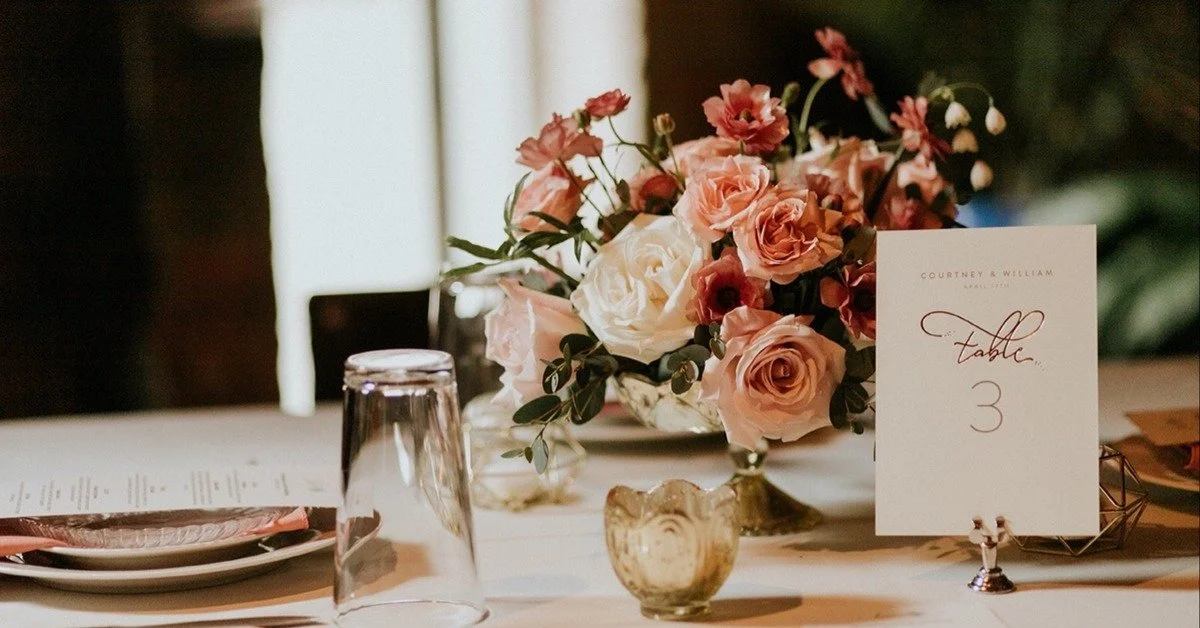Tips to Turn Your Creative Floral Hobby into a Sustainable Wedding Business
Honing in on your sales strategy is absolutely necessary to create and sustain your floral business.
Do you love flowers to the moon and back? Do you gaze at images on social media of beautiful floral arrangements that you'd love to create? Do you buy flowers anywhere you can and place them artfully into every vase in your house? That's how flower fever starts. It becomes all-consuming. You want to give in to this passion and create a real business so you can do what you love full-time and forever. Team Flower provides so many great resources for flower sourcing, décor sourcing, contracts, pricing, arrangement techniques, mechanics, etc. So once you've prepped yourself on those topics, you need clients so you can utilize all this new knowledge!
That's where the sales process comes in.
Honing your business acumen is essential if you want to create something that will sustain you and your family for years to come. So how is that done? It's an ongoing process that must continue almost daily. Here are a few tips:
Business Start-Up Preparation
Invest in business education. If you don't already have a background in business management and/or sales, try taking some basic classes with organizations such as Score through your local Chamber of Commerce. They're free, and you can even enlist a free business consultant to help your business get off the ground. Another option is to research educational groups within our industry. The International Live Events Association (ILEA) hosts monthly educational speakers—find your local chapter and sign up!
Build a portfolio. This is essential because our businesses are built on pretty photos. But how do we get those if we don't have clients? Volunteer to decorate family or work events. If you've joined ILEA, offer to provide flowers for one of their monthly meetings. Purchase flowers and create something you'd like to do for a future client. Take time to learn how to use your phone camera to capture them for social media and your website. OR partner with a budding photographer in your area who also needs to build their portfolio. Check out this comprehensive blog for more in-depth information on creating a portfolio.
Marketing
Know your costs. This requires time and research. Sign up with suppliers and review prices. Utilize the formulas you learned from Team Flower to determine your markup. Then stick to your prices. Giving things away only devalues our work and makes it difficult for us to make a living.
Determine what avenues you'll use to get your name out and bring in potential clients. This phase feels a bit like you're throwing things against a wall to see what sticks. Try networking, advertising on wedding sites, getting published on blogs, seeking free publicity, reaching out to ask to participate in venue open houses, starting a blog, etc. There is no single tactic to accomplish this; you just have to keep swimming.
Create a process for tracking all incoming leads. In the early days, it may be an excel or google sheet. It will help you to stay organized. Don't trust your memory! Write the process down, schedule the tasks with reminders, and don't skip steps.
Establish brand recognition. You need a schedule established to reach out to your leads regularly. Did you know that it takes an average of 7 exposures to a business before a prospect will respond? So keep reaching out, keep following up, and keep making yourself available. Create templates for a follow-up to save time and maintain consistency.
Determine your target client. You may do any flower job in the beginning because you're discovering your style and voice. But as time goes on, you'll decide what you're looking for in a client: budget, exclusivity, or style. Focus your marketing techniques to speak to that audience. For example, if you crave colorful weddings in an overly blush world, post images on your website and social media that will attract those brides. If you want to convey a versatility that spans the ages, share various styles, colors, and shapes.
As you prepare for weddings and events, there are several things you can do to prepare for your clients.
Event Preparation
Gather preliminary information on the event before talking with the prospect. If possible, find the answers to basic questions like style, budget, wedding party, guest count, etc. This will not only help you prepare for your first consultation, but it'll also help you to weed out any prospect that doesn't fit your client profile.
Utilize scheduling software. This will save you an immense amount of time. The prospect can simply visit your calendar and schedule a time to talk with you without the back and forth of comparing schedules and hours of availability. It also lets the prospect know that you're busy, orderly, and professional.
Invite the buyer to meet you. Many times in the wedding industry, we hear from only one-half of the couple. However, there are times when this person will not be the one paying for our services. Find out who needs to be convinced that you are worth investing in. Invite that person to attend your consultations. Taking a chance that the bride will adequately sell your business to her mom, who wants to DIY the flowers, is reckless.
Consultation
Now you have your first consultation. What to do? SELL. YOURSELF. Briefly. This is one of the hardest things to do for most people, but it is so important. Begin by telling them about the experience that helped get you where you are now. Maybe it's gardening with your grandma or visiting the local farmer's market every Saturday to buy cut flowers. You've done something to lead you to this point in time that makes you unique and special. Share it. Prospects love to know who they're dealing with so they can trust you.
Explain your sales process. Our clients don't always know what to expect. They've likely never planned a wedding. Even if they've hired other vendors since their engagement, your process will be different.
Now listen. Let your clients tell you all about their vision. They'll usually start with what's most important to them. Make a mental note to prioritize that topic. Walk them through their event in an orderly fashion, taking notes on all the ideas they have.
Focus on uncovering "pain points," i.e., your clients' needs. Wedding clients are generally uneducated on planning a wedding, so there will be areas where they're confused or need assistance. View those as opportunities to establish yourself as the expert. Help find solutions to their questions.
Make suggestions. Of course, you don't want to give away all your design ideas immediately. But share some thoughts on one or two items that you think will improve or build upon their vision. This shows them you're creative and forward-thinking.
Be prepared to handle any objections. One of the most common objections in the flower world is that flowers are expensive. Yes, they are. But teach them why—help them see the value in what you do. Put a lot of thought into this, and be ready to explain each of your points.
Creating a proposal for your clients is key, because that’s where you seal the deal!
Creating a Proposal
Set realistic expectations. Don't discuss or promise visions your clients can't afford. Most will appreciate you educating them on what they CAN get with their budget. Then if flowers are important enough to them, they'll up their budget because you've taken the time to explain the situation. Sometimes we encounter leads and prospects who refuse to compromise on a vision they can't afford. Don't waste time trying to convince them otherwise. A client with unreasonable expectations will be difficult to please, so don't set yourself up for failure.
Utilize technology. A proposal is a written explanation of the products and services you will provide to a specific prospect. Begin with a template (of your own making or a software app) and then edit based on their specific requests. Make it beautiful and send it out as quickly as possible. My first proposals were built in Microsoft Word. Not fancy, but it had all the essentials, including pretty pictures. Once you have some cash flow, invest in software that is designed for your business type to save time and manage all your sales activities.
Include at least one inspiration photo in your proposal that came from them, if they provided any. If they didn't, choose pictures that you feel represent the vision you discussed. But using one of theirs makes them feel like you listened to them. I've heard florists trying to sell the prospect on their own vision. It's ok to make suggestions, but too much of trying to steer their vision in another direction can make them feel as if the wedding is all about you. And it isn't.
Schedule a proposal review during the first consultation. Tell your clients when you'll deliver the proposal, give them a couple of days to ponder over it, then meet to discuss questions and options. If a prospect agrees to go ahead and schedule this review, they'll likely hire you. That's a great buying signal—they like you so far and are willing to go to the next step.
During the review, close the deal. Don't hesitate to ask. There's no reason to beat around the bush. They've had time to get to know you and ponder your proposal, and they should know by now whether they want to work with you. This is business, so be cordially aggressive to ensure you get the pay for all your hard work!
Implementation
Provide stellar customer service and products. Take pride in your work and be detail-oriented. Care for your clients. All of this leads to more incoming prospects, which leads to more sales!
Collect reviews. This is so very easily forgotten when you're busy with the rest of your sales process. But studies show that couples trust reviews as much as personal recommendations. How many of us have appreciated our neighbor or friend who referred us to the HVAC company that responded so quickly when the air went out in the middle of July?!
Remedy any issues immediately. What if something goes haywire and you make a mistake? We're all only human, and guess what? They are too. If you address the issue empathetically, they will likely forgive, seeing that you care about their client experience. Sometimes they'll leave a negative review without contacting you regarding the problem. If this happens, first respond to the review online professionally. Then, reach out privately and ask how you can make them feel better. Don't devalue your business but consider their perspective and determine a fair and reasonable way to make them feel heard and appreciated.
Continually seek ways to improve your sales process. If you uncover something that's not working, change it.
And that's it. Put yourself in your client's shoes and think about how and why you pay for a product or service. You want your doctor, dentist, auto repairman, etc., to listen to you, to be empathetic, reassuring, available, and helpful. Do the same for your prospects and trust the process you've established. It will work! Happy selling!









